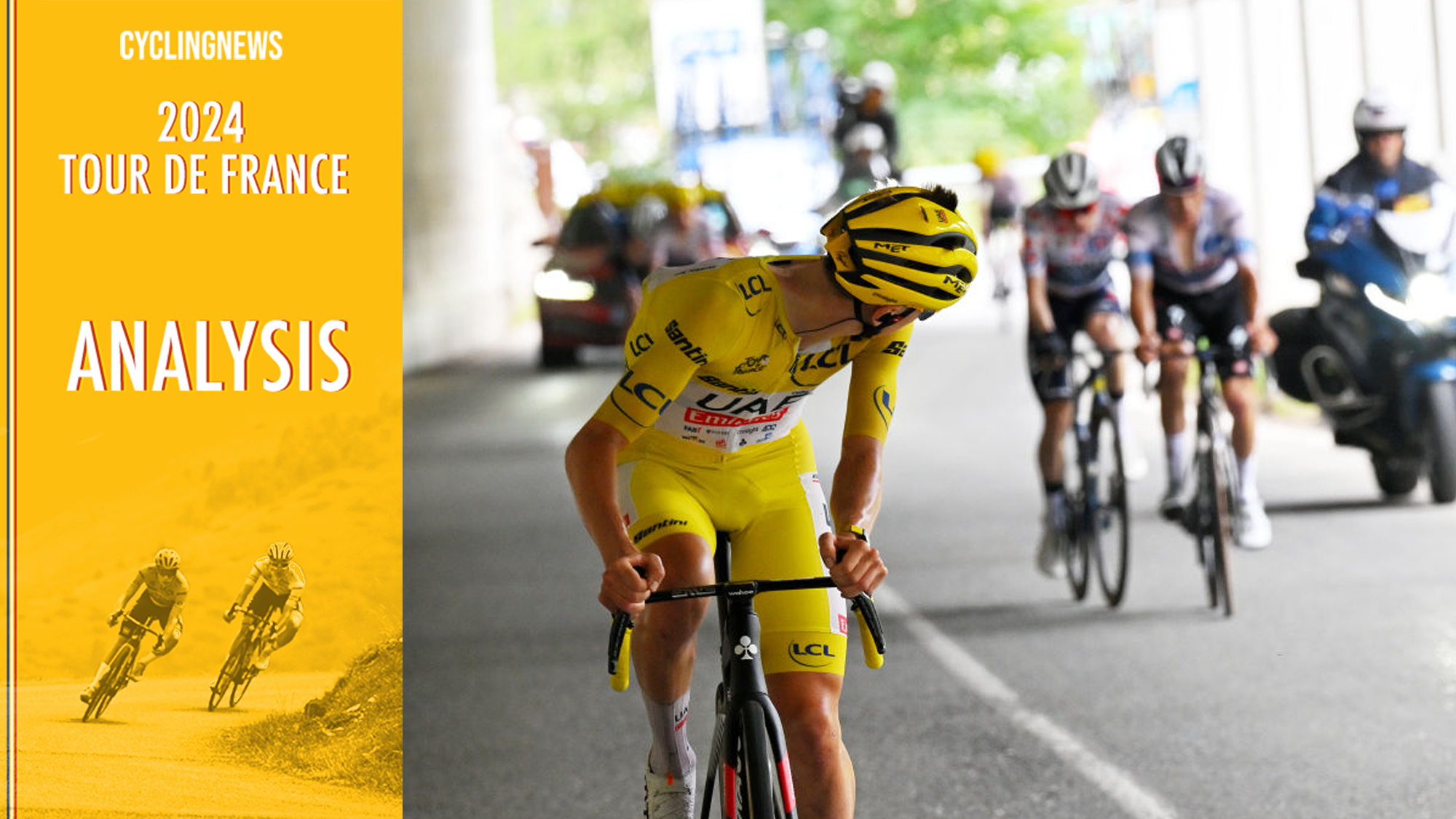
The Tour de France didn't formally end on the upper reaches of the Cime de la Bonette, but it was the point where Jonas Vingegaard understood that his race was run. Like a beaten candidate on election night, the projections from stage 19 told him that he no longer had a viable path to final victory in Nice.
Vingegaard's concession didn't come in a private telephone call to Tadej Pogačar but in a short radio message to his Visma-Lease a Bike teammates, confirming that he didn't have the strength to execute the plan of attack they had drawn up beforehand.
On the Col de le Loze 12 months ago, when the roles were reversed, the moment was captured for posterity. When Pogačar was dropped, his forlorn radio message – "I'm gone, I'm dead" – was broadcast on television almost immediately. Vingegaard's precise wording on Friday will doubtless mean we will have to wait for next year's Netflix instalment, but his actions here already told us all we needed to know.
Visma's Matteo Jorgenson and Wilco Kelderman had been dispatched up the road in the early break, but when the 2,800m summit of the Bonette came and went without a Vingegaard attack, it was abundantly clear that the Dane had resigned himself to the inalienable truth of this race – Pogačar is simply on another level.
After a promising start, Vingegaard's injury-interrupted preparation perhaps finally caught up with him over the past week. But that's only a part of the story. Pogačar's level of performance on this Tour was beyond what was believed to be possible beforehand.
"He just told us that he didn't feel he had the legs to drop Tadej," Visma directeur sportif Grischa Niermann said of the radio message. "That was also clear. We are here with the dream of winning the Tour with Jonas, but we saw in the last days that Pogačar is stronger."
The attack
By the top of the Bonette, Pogačar must have understood that Vingegaard had laid down arms and that the Tour was already won. But that didn't mean his race was already run, far from it. The final haul to Isola 2000 presented Pogačar with a chance to run up the score and, perhaps, settle a score in the process.
Vingegaard and his team, after all, had shown no mercy to Pogačar at his lowest ebb these past two years. On the Col de la Loze, Vingegaard put almost six minutes into a flagging Pogačar. At Hautacam the previous year, Pogačar had suffered the indignity of being dropped by green jersey Wout van Aert as he teed up Vingegaard's race-sealing attack.
With those moments in mind, Pogačar was perhaps never likely to opt for clemency here. He attacked viciously with a shade under 10km of Isola 2000 remaining, immediately distancing Vingegaard and setting off in pursuit of Jorgenson, who was by then alone at the head of the race, some 2:45 up the road.
Pantani comparisons have been a recurring motif for Pogačar in a summer where he will become the first man since the late Italian to win the Giro-Tour double. After obliterating Pantani's record time on Plateau de Beille at the weekend, Pogačar seemed to be emulating Il Pirata at Oropa here as he careered through the remnants of the break.
Riders of the immense quality of Jai Hindley, Simon Yates and Richard Carapaz – Grand Tour winners all – were made to look as though they were riding through quicksand as Pogačar scorched up the mountainside with disarming ease. Even though the scene is well familiar by now, the visual impact remains shocking.
Yates couldn't resist reaching out to touch the flame, even though he knew he would only be burnt. "It was actually a mistake to try to follow him," he said. "I blew myself up for the final 2k or whatever it was. Yeah, that's all she wrote."
The final line was written by Pogačar, who made a point of accelerating past Jorgenson when he caught the American inside the final 2km. Pogačar insisted that he had wanted to win the stage to thank his UAE Team Emirates companions, having discussed the idea during the team's training camp at Isola 2000 in June.
Maybe, but Pogačar admitted to second thoughts when he realised that his key domestique Adam Yates' brother was among the escapees. Those doubts were banished, however, once he learned that it was a Visma rider alone at the head of the race. "I wanted to catch Matteo in the final because the whole team put pressure on us from the start," Pogačar said.
No gifts, as the saying goes.
Pogačar pressed on, denying Visma their stage victory and stretching his overall lead on Vingegaard beyond five minutes. It's hard to imagine Pogačar will settle for that buffer in Nice, despite his protestations to the contrary. After all, he had the Giro d'Italia effectively sealed by stage 7, but even with a Tour de France still to win, he proceeded to attack incessantly and extend his lead to just shy of ten minutes.
It has been apparent for years that Pogačar's approach to leading a Grand Tour couldn't be further removed from the kind of coalition building and wealth distribution favoured by men like Jacques Anquetil and Miguel Induráin in generations past. By now it's something of a cliché, but Pogačar has rather more in common with the dictatorial approaches of Eddy Merckx and Bernard Hinault. After wresting back control, it's no surprise that he wanted to lay down his law.
The Tour is over, but Pogačar hasn't yet decided on the final score.
Get unlimited access to all of our coverage of the Tour de France - including breaking news and analysis reported by our journalists on the ground from every stage of the race as it happens and more. Find out more.







